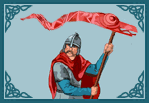 |
 |
|||
|
|
, |
Owein was the eldest son of King Urien of North Rheged. For most of his life, Owein supported his father with his warband of 'ravens', defending the borders of their kingdom, and Northern Britain in general, against Anglo-Saxon incursions. He was the hero of the Battle of Argoed Llwyfain (Leeming Lane, Yorks) where he killed the great Fflamddwyn (the Firebrand) - generally thought to have been King Theodoric of Bernicia who died in 589 Owein married Penarwen ferch Culfanawyd but he also fell in love with Princess Teniu, the daughter of King Letan Luyddoc (of the Host) of Gododdin. As a married man, their love was obviously forbidden an, when it was found that poor Teniu was pregnant she underwent extraordinary tortures before the two were finally able to unite in safety, in Rheged. After his father's assassination, around 585, Owein only managed to hang onto his kingdom for a few years. He was under intense pressure from Urien's old British enemies-turned-allies-turned-enemies. His brother, Elffin, was attacked by King Gwallawc Marchawc Trin (the Battle Horseman) of Elmet; Owein himself with his brother, Pasgen, had to fight off King Dunaut Bwr (the Stout) of the North Pennines. Then King Morcant Bulc of Bryneich and, Bran, probably his brother, moved in for the final blow. Owein fell and so did the power of Rheged. Owein was said to have been buried in a place either called Llan-Forfael or Lan-Heledd, neither of which have been identified, but another tradition indicates the churchyard of St. Andrew in Penrith, where his supposed grave is still pointed out. Catreath was lost to the Anglo-Saxons of Deira soon afterwards and Rheged probably contracted to its homeland around Caer-Ligualid (Carlisle). If Owein's brothers or sons ever managed to rule as kings, details of their reigns are lost but his nephew, Rhoyth ap Rhun, may eventually have inherited the Throne. Owein was transformed into a Knight of the Round Table called Sir Yvain in a number of Arthurian literary works. Notable amongst these are the Mabinogion attached story, the Dream of Rhonabwy, and Chrétien de Troyes' Yvain based on an old Welsh story, Iarlles y Ffynnawn. Records of King Owein date back to the 6th century. He is generally considered historic.
|
||
| © Nash Ford Publishing 2001. All Rights Reserved. | ||||




